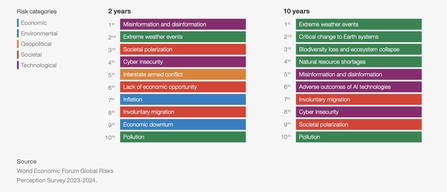While the world faces numerous crises at this time, the most pressing issues are still climate change and ecological degradation. The World Economic Forum Global Risks Report 2024, based on consultation with 1200 experts around the world, identifies the main risks that we face over the short and medium terms. Of medium-term (2-10 years) risks identified by the report, five of the top ten risks including the top four are environmental. These include biodiversity loss and ecosystem collapse.
Election Focus: The Climate and Ecological Crises

Global Economic Forum Global Risk Perception
Ecological degradation is closely linked with and driven by climate change. The destruction of natural habitats, pollution of air and water, and loss of biodiversity not only threaten ecosystems but also jeopardize our own health and livelihoods.
The well documented loss of bees and other insect pollinators, which are vital for the pollination of three-quarters of the world’s crops, is just one factor. The loss of abundance of once common farmland birds that eat crop pests and the debilitating loss of soil and soil biodiversity such as fungi and other detritivores, which break down organic matter, are all having a huge impact on food production.
Dorset is not immune to the impacts of biodiversity loss and environmental degradation. Shockingly, one-in-forty species ever recorded in Dorset are no longer present and 20% of our bee species are locally extinct. Agricultural inputs of nitrate-based fertiliser led to the pollution of waterways and ultimately our seas, damaging marine habitats and the species that depend on them. This is very evident in Poole Harbour.
Things have to change and quickly. There is increasing evidence that climate change is accelerating and the impacts on biodiversity will only get worse. We need our elected bodies to lead change locally and nationally. With the Dorset Council elections happening very shortly and a general election not far away, it is our opportunity to demand action from our political leaders to tackle these crises head-on.
The decisions we make today will have profound implications for future generations. We need to make more space for nature in our landscapes, increase investment in renewable energy and promote sustainable practices to create a more resilient and equitable world for our children and grandchildren.
Addressing the climate and ecological crises through investment in innovation, and clean technologies can lead to significant economic opportunities, including job creation. Transitioning to a low-carbon economy not only mitigates the risks associated with climate change but also unlocks new opportunities for growth and prosperity.
In conclusion, the UK election year presents a critical opportunity for us to demand action on the climate and ecological crises. By making our voices heard and holding our elected representatives accountable, we can drive the change we need to see.
I encourage everyone to challenge election candidates to commit to positive action for the environment.

